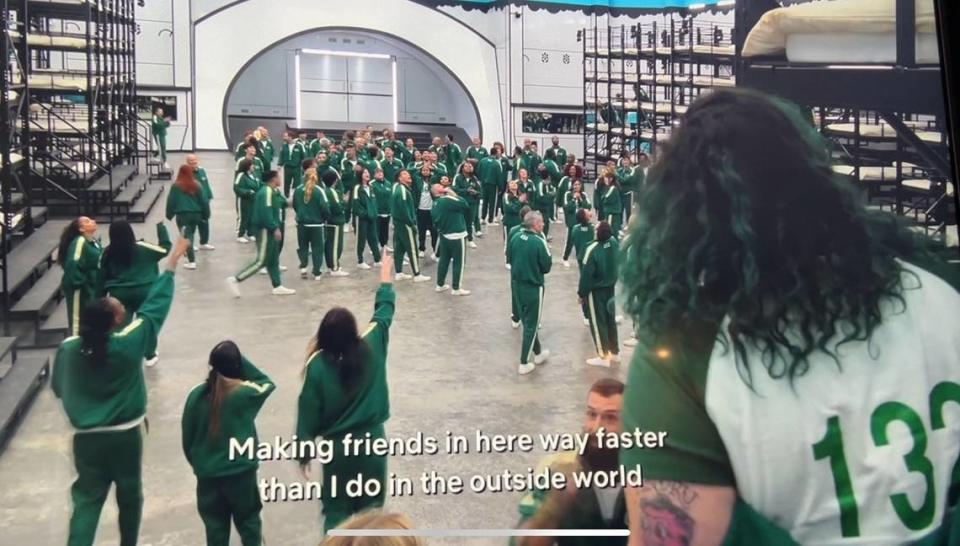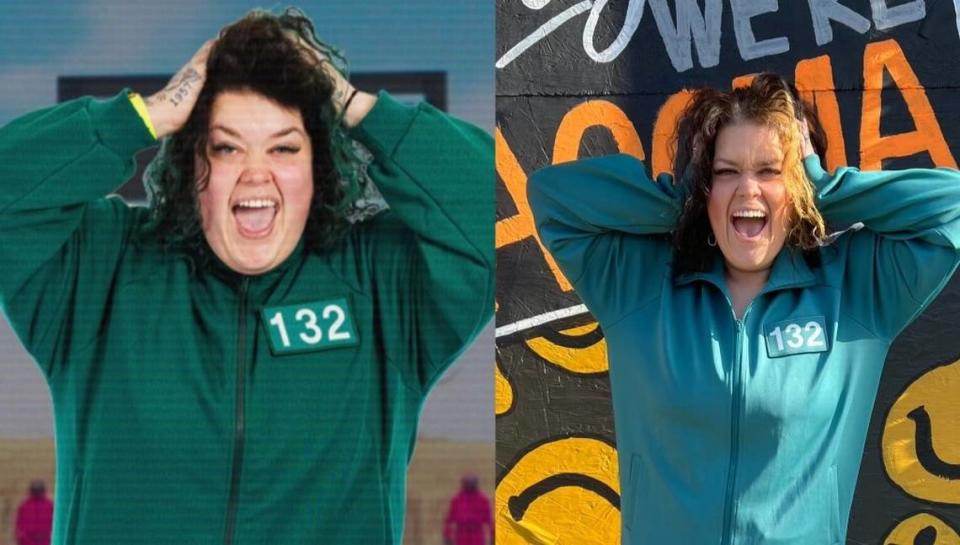The owner of a WA LGBTQ+ bar competed on a controversial reality show. She has no regrets
- Oops!Something went wrong.Please try again later.
Courtney Moore has heard the critiques — and the criticism. She gets where it’s coming from.
When the Netflix series Squid Game came out in 2021, Moore was a fan. It’s a dark show, she acknowledges — a nihilistic social commentary on wealth, greed, class and unchecked capitalism, created by South Korean writer and director Hwang Dong-hyuk — but she was hooked, even if she occasionally had to look away.
On the fictional show, characters compete to the death for a slim chance to win billions. They don’t just want the money; they need it. All are desperate and poverty-stricken, living in an extreme world of haves and have-nots, so hopeless that the proposition — riches or a brutal, voyeuristic demise — is worth the risk.
All the while, wealthy elites watch for pure entertainment and theater, we soon learn — a fantasy difficult to separate from the cold economic realities of the present day, one of many things that made the show prescient and chillingly detached.
In real life, the show was a global phenomenon, spawning Saturday Night Live spoofs, think pieces and critical acclaim — not to mention millions of streaming viewers.
So when Netflix announced plans to adapt Squid Game the drama into Squid Game: The Challenge — a reality competition pitting 456 real-life people, including Moore, in a battle for $4.56 million — it wasn’t surprising that pop culture pundits and average observers found the idea tough to stomach, even if the streaming media company assured no one would be killed off during the making.

Watching make-believe characters subjected to physical, mental and emotional torture in hopes of escaping portrayed poverty is one thing. Finding entertainment in a nonfiction version, even with the knowledge that contestants were willful participants, is another.
When some show contestants alleged that the taping of the show was inhumane, so long and grueling in one instance that players collapsed when the cameras weren’t rolling — while others suffered hypothermia and nerve damage — it only added to the criticism.
The competition in question, prominent in the first episode and promotional trailers, featured an elaborate re-creation of the infamously brutal red light, green light game that has come to define the blood-spattered original series. Instead of being shot on sight by a towering, murderous doll, an ink pack explodes on the chest of those eliminated.
From there, contestants who survived were shipped off to a massive, made-for-reality-TV dormitory, complete with sterile, multi-tier bunk beds, another nod to the namesake.
Needless to say, the reaction was complicated. Writing for Vox, Alex Abad-Santos described The Challenge, which dropped the final episode of its first season this week, as groundbreaking in its ability to create “existential panic” in its contestants.
In particular, Abad-Santos underscored the impossibility of compartmentalizing the show’s dystopian, fictionalized inspiration, while also noting that the actual experience of watching “regular, real people” grapple with “their fragile existence” is “kinda great.”
Moore? She had no qualms.
Before the public uproar, 33-year-old bartender and owner of The Mix, Tacoma’s preeminent LGBTQ+ bar, jumped at the opportunity, eager to compete for what’s billed as the biggest cash prize in reality TV history, she said.
With the benefit of hindsight, Moore described her time on the show as “life-changing.”
“Anyone who knows me knows that I would do absolutely anything for anyone, anytime, and that I fight for the community — more than anything. But I’ve never really fully shown up for myself,” Moore said on Thursday by phone from Florida, where she’d traveled to watch The Challenge finale with some of her former castmates.
In January, Moore explained, she was flown to London and put up in a hotel, barred from interacting with hundreds of potential contestants from around the world who were arriving at the same time.
At first, Moore thought she was simply a standby, unlikely to appear on the show. Then a member of the production staff knocked on her door, told her she got the nod and assigned her a player number: 132.
Surviving the initial red light, green light challenge — an ordeal that culled the 456 contestants by more than half in a single day — taught Moore something about herself, she said.
“Competing, and successfully completing such an incredible task, really showed me what I’m capable of,” Moore explained. “If I’m capable of something like that, something that people said was the hardest thing they’ve ever done, then why are there excuses in other directions of my life?”

The travails extended far beyond the taping of the show, Moore told me.
She didn’t win big, which would have been readily apparent to her regulars at The Mix — had she been allowed to tell them. Or better yet, regale them with stories of how her ink pack exploded after she was done in the second episode by the now infamous cookie challenge.
A strict non-disclosure agreement prevented Moore from talking about any of it, legally, she explained.
Essentially, she was whisked off to England almost 12 months ago, competed on the show for a little more than a week of taping, had one of the most intensely difficult and unexpectedly profound experiences of her life, and then headed back to Tacoma — forced to act like nothing happened.
Until Squid Game: The Challenge debuted last month, most had no idea Moore competed on the show, she said. Earlier this month, she shared her story with Scott Greenstone of KNKX.
The forced silence messed with her mind, Moore admitted to me, not necessarily in a bad way, just a uniquely bizarre one.
“Something broke in my brain when I was in red light, green light. It just genuinely changed the chemistry of my brain, who I felt like I could be and what my potential was,” said Moore, who decided to have bariatric surgery shortly after returning and has lost 80 pounds since appearing on the show.
“It was kind of this secret that I’ve buried, and I had to bury it so deep that I convinced myself it wasn’t that interesting,” Moore told me.
“It’s been a wild ride. I’ve had such a drastic lifestyle change that I was kind of able to hide it, but it’s been a whirlwind.”
With the finale now available on Netflix, that part is over, at long last, an occasion Moore described as a relief.
Looking back on it, she’d do it all again, she said.
There are things she would do differently, of course, and it’s clear she still holds a good-natured grudge against “player 299,” the contestant who made the decision that ultimately led to her elimination in the second episode. But mostly, she’s grateful for the experience.
As for arguments that The Challenge was inherently immoral, morally despicable or callously exploitative of its contestants?
Moore gets it, she promised. She’s not missing the point or the complexity. That simply wasn’t her experience, she said.
From where she’s standing today, it was an adventure to look back on in amazement, a physical and emotional test that helped unlock her potential.
“Having watched the original, there were moments when I said, ‘Oh, my God, can you pause this? I have to take a breath.’ It was so grueling and intense … and also quite beautiful, just in how dark it was,” Moore said.
“I think on the (reality show version), you had a lot of people that went in with the idea that this is an opportunity to win the lottery,” she added.
“For me, it kind of brought back the spirit I knew I had; maybe it got lost a little.
“It reignited my drive and my possibilities.”
